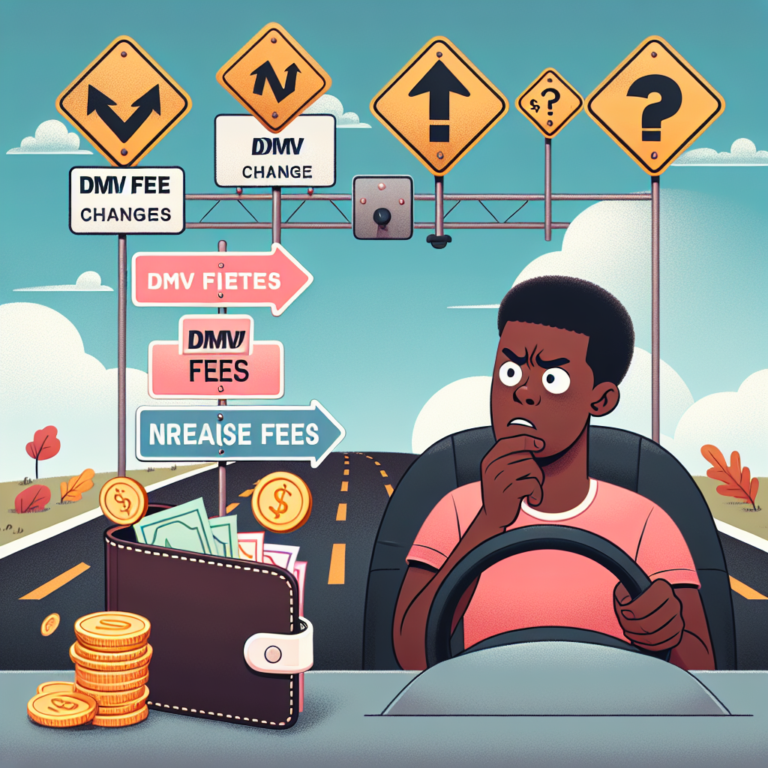Navigating the intricacies of the Department of Motor Vehicles (DMV) can be daunting enough without the added headache of fluctuating fees. Changes to DMV fees often go unnoticed until you find yourself at the counter or when your renewal notices arrive in the mail. This guide aims to break down the latest DMV fee changes, what they entail, and how they might impact you as a motorist.
Understanding DMV Fees
Before delving into specific changes, it’s essential to understand that DMV fees can vary greatly by state, as each state’s government establishes its own pricing structure. These fees can cover a swath of services, including:
- Vehicle registration and renewal
- Title transfers
- Driver’s licenses and identification cards
- Road tests and other services
- Special plates and permits
Fees can also be adjusted in response to legislation changes, budgetary requirements, or inflation. As a result, it’s vital to stay informed.
Latest Fee Changes
As of 2023, many states have undergone fee adjustments, some of which are aimed at improving state revenues and others directed towards specific initiatives, such as environmental programs. Here’s a summary of some notable changes:
1. Vehicle Registration Fees
Several states have increased vehicle registration fees to account for rising costs associated with roadway maintenance and infrastructure improvements. For example, California has raised its annual registration fees slightly to bolster funds for an aging transportation network.
2. Driver’s License Fees
Some states have increased the fees for renewing or obtaining driver’s licenses. States like Florida and Texas have seen minor increases, which can amount to as much as ten dollars. This change can significantly affect individuals needing to renew their licenses frequently.
3. Title Transfer Fees
Title transfer fees have also seen adjustments in various states. New York, for instance, raised its title transfer fee from $50 to $75, emphasizing the necessity of maintaining accurate vehicle ownership records.
4. Special and Customized Plates
In many states, the demand for specialty and personalized license plates has surged, prompting increases in associated fees. For example, in Michigan, the cost for custom plates has gone up by $5. While many people enjoy having unique identifiers for their vehicles, it’s essential to note these additional costs.
5. Environmental and Electric Vehicle Fees
In a push for sustainability, some states have implemented additional fees for gas-powered vehicles while offering discounts for electric vehicles (EVs). For example, Maryland introduced a registration fee for certain types of EVs, with a percentage going toward green initiatives.
What These Changes Mean for You
Staying Ahead of Renewals
It’s crucial to be aware of the latest fee changes to avoid surprises during renewal times. Regularly checking the DMV website for your state can provide up-to-date information on any impending fee changes and what they entail.
Budgeting for Higher Costs
In light of these changes, it may be prudent to adjust your budget for vehicle-related expenses. Set aside additional funds for future DMV services to ensure that you’re prepared for any increases in fees.
Exploring Options for Savings
If facing a fee increase, consider options that might mitigate this impact. For instance, some states offer discounts for early renewals or for opting for certain online services. Explore your options to potentially save on fees.
Participation in Public Discourse
The introduction of new fees often accompanies public discussions about government funding for infrastructure and services. Engaging in community discourse can provide insight into how these fees contribute to broader initiatives and allow you to voice your opinions to local representatives.
Conclusion
DMV fee changes can feel like just another bureaucratic hurdle to overcome, but understanding them is key to managing your automotive responsibilities effectively. By staying informed, budgeting appropriately, and exploring available options, you can navigate these adjustments with ease. As always, keeping communication open with your DMV and being proactive about understanding your state’s regulations can save you time and money in the long run.


